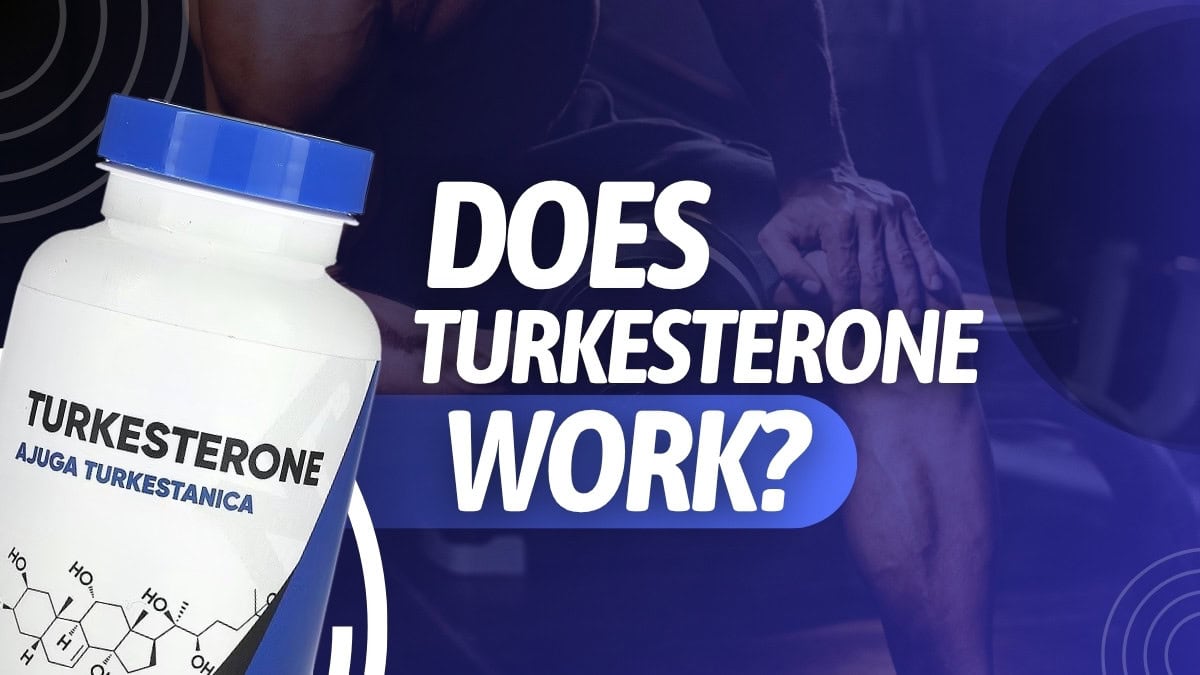
As men age, their testosterone levels drop, resulting in diminished strength, energy, and libido.
The current options available to combat this are testosterone therapy or testosterone boosters. The former is by prescription only and can come with some unwelcome side effects, while the latter has been criticized by some as merely glorified multivitamins.
Then there’s turkesterone. It’s a plant-based ecdysteroid, and preliminary research says it may be the real deal, but more work needs to be done regarding possible turkesterone benefits and side effects.
Let’s take a deeper dive into the burning question: What does turkesterone do?
What Is Turkesterone?
Turkesterone is a naturally occurring steroid compound found in Central Asian plants such as Ajuga turkestanica. Classified as an ecdysteroid, it doesn’t bind with androgen receptors like testosterone, meaning it doesn’t affect your body’s hormone production process like anabolic steroids do.
Turkesterone is also an adaptogen, so it helps your body deal with stress and fatigue and promotes an overall sense of well-being.
Why Are People Taking Turkesterone?
While research in humans is still limited, many users are drawn to turkesterone for its purported abilities to help with the following aspects of fitness and overall well-being.
Muscle Growth and Strength Boost
In some studies, turkesterone has been shown to support muscle protein synthesis, improve the muscle-to-fat ratio, and promote lean muscle growth, leading to improved size and strength [1].
Performance Enhancement
Preliminary research indicates turkesterone may increase ATP synthesis, the source of cellular energy, which can improve endurance and reduce fatigue for longer and stronger workouts [2].
Better Recovery
Animal studies suggest that turkesterone may increase glycogen levels, which replenish the energy needed to speed up recovery and reduce muscle tissue soreness after a thorough workout routine [1].
Adaptogenic Effects
Classified as an adaptogen, turkesterone may help support your ability to deal with stress, improve mood, enhance sleep, and improve general well-being.
How Does Turkesterone Work?
Generally, turkesterone seems to boost protein synthesis by enhancing mRNA, a single-stranded RNA, to enhance the uptake of the amino acid leucine into muscle cells.
Turkesterone also activates the phosphoinositide 3-kinase pathway that plays an important role in protein synthesis, cell growth, and muscle hypertrophy.
Additionally, turkesterone may help improve muscle recovery by aiding in the removal of lactic acid to reduce inflammation and support muscle repair.
Does Turkesterone Really Work?
Right now, the evidence on turkesterone’s efficacy as an exercise and bodybuilding supplement seems to be relying on anecdotal evidence, much of which is split between pro and con.
The science on the efficacy of turkesterone is still in its exploratory stages, with no definite answer either way and a host of possibilities yet to be explored.
What Does Science Say?
The science on how turkesterone affects humans is currently very limited. Some of the preliminary findings include:
- A preliminary study in rats found that turkesterone demonstrated anabolic activity in skeletal muscle, suggesting it may play a role in protein synthesis and building muscle [3].
- The single human study available online found no significant improvement in body composition after 4 weeks of 500 mg/day supplementation [4].
- Possible avenues for further research include investigating turkesterone’s role in protein synthesis. Specifically through the P13K/Akt pathway, where it may increase leucine uptake, promote nitrogen retention, and create a better protein metabolism profile [5].
Anecdotal Evidence From Users
One amateur bodybuilder’s turkesterone before and after story on purchasing a supplement from Walmart is that they’ve been taking it for over a month and have gained 6 lbs of mass. According to them, this stuff really works if you’re consistent [6].
A 56-year-old user on Reddit says they tried 420 mg of a turkesterone supplement and claim it cut their recovery time in half and increased their stamina [7].
According to a user survey based on 222 responses on the Prohormones website, those who took the German Pharma Turkesterone supplement reported the following:
- 87.8% reported feeling the effects of turkesterone, 68.5% within the first 4 weeks.
- 64.9% reported it was the best natural muscle mass builder they’ve used.
- 76.6% would recommend taking a turkesterone supplement to a friend [8].
Another Reddit user said they tried a turkesterone supplement a while back and it does nothing as far as they can tell. Others this person knows say the same thing [9].
Expert Insights
According to a 2024 abstract on the NIH PMC website, the A. turkestanica plant shows promise as a therapeutic agent for treating chronic tiredness, heart disorders, and neurodegenerative diseases. It concluded that further studies are necessary to assess its effectiveness for obesity and osteoporosis [1].
FAQs About Turkesterone
Here are answers to questions people have been asking that are similar to “Does turkesterone work, and is turkesterone natural?”
Is Turkesterone Safe?
Based on current limited research and anecdotal reports, turkesterone is generally considered safe for short-term use by healthy individuals, with no need for post-cycle therapy.
While some users have anecdotally reported turkesterone side effects like nausea, upset stomach, headache (especially on an empty stomach), and even hair loss, these claims are not yet conclusively backed by scientific studies. In addition, animal studies suggest low liver toxicity.
Is Turkesterone Stronger Than Creatine?
In terms of strength building and other athletic performance benefits, creatine has much more scientific evidence and research backing it up than turkesterone does. In fact, creatine is one of the most extensively studied strength-building supplements with proven results and documented mechanisms of action in the body.
Is Turkesterone Toxic to the Liver?
Based on available research and its known chemical structure, turkesterone is considered a low risk for causing liver toxicity. In fact, in one study involving mice with induced liver damage, turkesterone was shown to normalize liver function at a rapid rate [10].
Does Turkesterone Decrease Testosterone?
Unlike steroids or testosterone boosters, turkesterone is a plant-based ecdysteroid that works through non-hormonal pathways. It doesn’t bind to androgen receptors or interfere with testosterone levels, and current evidence suggests it does not suppress natural testosterone production, making it a safer option for muscle support..
Is Turkesterone a Placebo Supplement?
Because turkesterone is still in the early stages of scientific research, there is no definitive evidence proving its effectiveness in humans. As a result, some of its perceived benefits may be due to the placebo effect.
Is Turkesterone a Steroid?
While chemically it’s a “steroid” in the broader sense of being a steroidal compound, it is not an anabolic-androgenic steroid and is generally considered to be non-hormonal in humans.
Does Turkesterone Work? Conclusion
If you’re looking for a new, all-natural, non-toxic muscle-building supplement, turkesterone is an ecdysteroid naturally found in plants that is showing some promise.
The actual research on it is still in the preliminary stages, but there is strong anecdotal evidence that it can boost muscle growth, strength, and recovery like testosterone, but minus the side effects.
Of course, before considering this or any other supplement, you should first contact your doctor to discuss whether turkesterone would be right for you.
 11 Niche Experts
11 Niche Experts
 100+ Product Reviews
100+ Product Reviews
 50+ Tested Products
50+ Tested Products
At BestDaily, our mission is simple: to help you make confident, informed decisions about the products that impact your daily life. Whether you're searching for wellness essentials or lifestyle upgrades, we combine hands-on testing with expert analysis to highlight what truly works.

